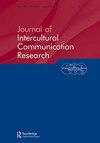2019冠状病毒病大流行期间印度的伊斯兰恐惧症:Tablighi Jamaat案例
Q1 Social Sciences
Journal of Intercultural Communication Research
Pub Date : 2023-04-04
DOI:10.1080/17475759.2023.2198537
引用次数: 0
摘要
摘要伊斯兰恐惧症是当今世界的一个热点问题。这项研究旨在分析新型冠状病毒在印度爆发期间针对穆斯林和伊斯兰教的言论,穆斯林少数群体Tablighi Jamaat成为袭击目标,并被认为是传播病毒的责任人。该研究采用批判性话语分析法分析了印度政客、政府要员和普通印度用户的推文,以找出他们话语中的仇视伊斯兰教主题和意识形态结构。研究人员假设,伊斯兰恐惧症是印度政治交流的一个组成部分,这在他们的话语和修辞手段中也很明显。研究人员有目的地选择了印度政客、政府官员和普通印度推特用户针对穆斯林和伊斯兰教的50条最具争议的推文,并通过Wodak(2014)的政治话语策略进行了批判性话语分析。研究结果表明,印度人使用歧视穆斯林和伊斯兰教的语言来制造“我们与他们”的差异,并对印度穆斯林使用反伊斯兰策略和仇视伊斯兰教的言论,并在印度人中宣传穆斯林和伊斯兰教是新冠肺炎在印度爆发的罪魁祸首的共同信念。本文章由计算机程序翻译,如有差异,请以英文原文为准。
Islamophobic Discourses in India During COVID-19 Pandemic: A Case of Tablighi Jamaat
ABSTRACT Islamophobia is a hot issue in the world nowadays. This study aimed to analyse the discourses which were produced against Muslims and Islam during the novel coronavirus outbreak in India, where the Muslim minority group Tablighi Jamaat was targeted and held responsible for spreading the virus. The study employed Critical Discourse Analysis to analyse selected tweets from Indian politicians, government dignitaries, and common Indian users to find out Islamophobic themes and ideological structures in their discourses. The researcher hypothesizes that Islamophobia is an integral feature of Indian political communication which is also obvious in their discursive and rhetorical devices. The researcher purposively selected 50 of the most controversial tweets by Indian politicians, government officials, and common Indian Twitter users against Muslims and Islam and carried out a critical discourse analysis through political discourse strategies by Wodak’s (2014). The findings of the study reveal that Indians use discriminatory language against Muslims and Islam to create a difference of “us versus them” and by using anti-Islamic strategies and Islamophobic remarks against the Muslims of India and propagating a common belief in Indians that Muslims and Islam are the main culprit of the COVID-19 outbreak in India.
求助全文
通过发布文献求助,成功后即可免费获取论文全文。
去求助
来源期刊

Journal of Intercultural Communication Research
Social Sciences-Cultural Studies
CiteScore
2.00
自引率
0.00%
发文量
20
 求助内容:
求助内容: 应助结果提醒方式:
应助结果提醒方式:


